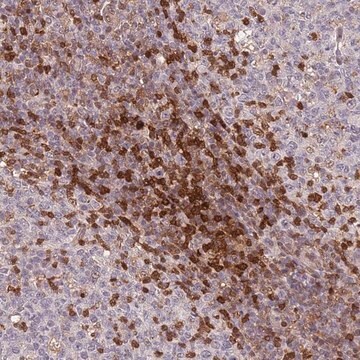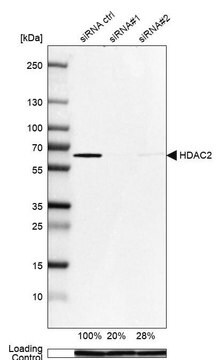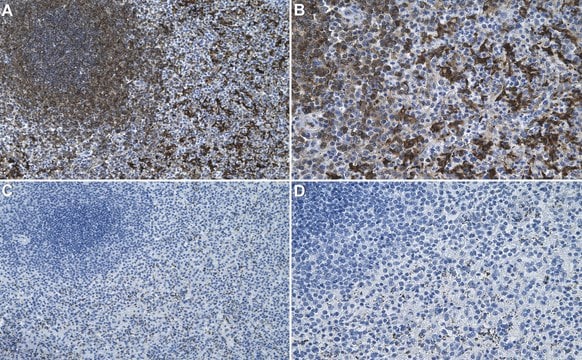추천 제품
생물학적 소스
rabbit
결합
unconjugated
항체 형태
affinity isolated antibody
항체 생산 유형
primary antibodies
클론
polyclonal
제품 라인
Prestige Antibodies® Powered by Atlas Antibodies
형태
buffered aqueous glycerol solution
종 반응성
human
향상된 검증
orthogonal RNAseq
Learn more about Antibody Enhanced Validation
기술
immunoblotting: 0.04-0.4 μg/mL
immunohistochemistry: 1:50-1:200
면역원 서열
MNHTVQTFFSPVNSGQPPNYEMLKEEHEVAVLGAPHNPAPPTSTVIHIRSETSVPDH
UniProt 수납 번호
배송 상태
wet ice
저장 온도
−20°C
타겟 번역 후 변형
unmodified
유전자 정보
human ... IFITM3(10410)
일반 설명
IFITM3 (interferon induced transmembrane protein 3) is a transmembrane-domain protein (5-18kDa) belongs to a family of murine genes. It acts as a cellular restriction factor. It is associated with various cellular processes such as cell adhesion, immune-cell regulation, germ cell homing and maturation, and bone mineralization. It is involved in the inhibition of infection by influenza virus and many other pathogenic viruses.
면역원
Interferon-induced transmembrane protein 3 recombinant protein epitope signature tag (PrEST)
애플리케이션
All Prestige Antibodies Powered by Atlas Antibodies are developed and validated by the Human Protein Atlas (HPA) project and as a result, are supported by the most extensive characterization in the industry.
The Human Protein Atlas project can be subdivided into three efforts: Human Tissue Atlas, Cancer Atlas, and Human Cell Atlas. The antibodies that have been generated in support of the Tissue and Cancer Atlas projects have been tested by immunohistochemistry against hundreds of normal and disease tissues and through the recent efforts of the Human Cell Atlas project, many have been characterized by immunofluorescence to map the human proteome not only at the tissue level but now at the subcellular level. These images and the collection of this vast data set can be viewed on the Human Protein Atlas (HPA) site by clicking on the Image Gallery link. We also provide Prestige Antibodies® protocols and other useful information.
The Human Protein Atlas project can be subdivided into three efforts: Human Tissue Atlas, Cancer Atlas, and Human Cell Atlas. The antibodies that have been generated in support of the Tissue and Cancer Atlas projects have been tested by immunohistochemistry against hundreds of normal and disease tissues and through the recent efforts of the Human Cell Atlas project, many have been characterized by immunofluorescence to map the human proteome not only at the tissue level but now at the subcellular level. These images and the collection of this vast data set can be viewed on the Human Protein Atlas (HPA) site by clicking on the Image Gallery link. We also provide Prestige Antibodies® protocols and other useful information.
생화학적/생리학적 작용
The activity of IFITM3 (interferon induced transmembrane protein 3) is post-translationally modulated by S-palmitoylation and lysine ubiquitination. IFITM3 shows controlled clustering in membrane compartments and antiviral activity against influenza virus in post S-palmitoylated condition. It has reported that S-palmitoylation positively regulates IFITM3 membrane affinity and antiviral activity. On the contrary, ubiquitination decreases localization with endolysosomes and decreases antiviral activity. It has also corroborated that gene silencing of IFITM3 plays an important role in glioma cell growth and migration. It can be used as a tumor biomarker as it possesses characteristics of inhibiting tumor development.
특징 및 장점
Prestige Antibodies® are highly characterized and extensively validated antibodies with the added benefit of all available characterization data for each target being accessible via the Human Protein Atlas portal linked just below the product name at the top of this page. The uniqueness and low cross-reactivity of the Prestige Antibodies® to other proteins are due to a thorough selection of antigen regions, affinity purification, and stringent selection. Prestige antigen controls are available for every corresponding Prestige Antibody and can be found in the linkage section.
Every Prestige Antibody is tested in the following ways:
Every Prestige Antibody is tested in the following ways:
- IHC tissue array of 44 normal human tissues and 20 of the most common cancer type tissues.
- Protein array of 364 human recombinant protein fragments.
결합
Corresponding Antigen APREST85237
물리적 형태
Solution in phosphate-buffered saline, pH 7.2, containing 40% glycerol and 0.02% sodium azide
법적 정보
Prestige Antibodies is a registered trademark of Merck KGaA, Darmstadt, Germany
면책조항
Unless otherwise stated in our catalog or other company documentation accompanying the product(s), our products are intended for research use only and are not to be used for any other purpose, which includes but is not limited to, unauthorized commercial uses, in vitro diagnostic uses, ex vivo or in vivo therapeutic uses or any type of consumption or application to humans or animals.
적합한 제품을 찾을 수 없으신가요?
당사의 제품 선택기 도구.을(를) 시도해 보세요.
Storage Class Code
10 - Combustible liquids
WGK
WGK 1
Flash Point (°F)
Not applicable
Flash Point (°C)
Not applicable
개인 보호 장비
Eyeshields, Gloves, multi-purpose combination respirator cartridge (US)
시험 성적서(COA)
제품의 로트/배치 번호를 입력하여 시험 성적서(COA)을 검색하십시오. 로트 및 배치 번호는 제품 라벨에 있는 ‘로트’ 또는 ‘배치’라는 용어 뒤에서 찾을 수 있습니다.
Jacob S Yount et al.
Nature chemical biology, 6(8), 610-614 (2010-07-06)
Identification of immune effectors and the post-translational modifications that control their activity is essential for dissecting mechanisms of immunity. Here we demonstrate that the antiviral activity of interferon-induced transmembrane protein 3 (IFITM3) is post-translationally regulated by S-palmitoylation. Large-scale profiling of
Yi-Song Wang et al.
Annals of clinical and translational neurology, 8(3), 558-570 (2021-01-20)
Rasmussen's encephalitis (RE) is a rare and severe progressive epileptic syndrome with unknown etiology. Infection by viruses such as human cytomegalovirus (HCMV) has been hypothesized to be a potential trigger for RE. Interferon-induced transmembrane protein-3 (IFITM3) single-nucleotide polymorphism (SNP) rs12252
Jacob S Yount et al.
The Journal of biological chemistry, 287(23), 19631-19641 (2012-04-19)
The interferon (IFN)-induced transmembrane protein 3 (IFITM3) is a cellular restriction factor that inhibits infection by influenza virus and many other pathogenic viruses. IFITM3 prevents endocytosed virus particles from accessing the host cytoplasm although little is known regarding its regulatory
Bing Zhao et al.
BMC neurology, 13, 210-210 (2013-12-29)
Interferon induced transmembrane protein 3 (IFITM3) is transcribed in most tissues and highly interferon-inducible. However, the role of IFITM3 in cancer is still poorly understood. Expression levels of IFITM3 were analyzed in 60 glioma patients by immunohistochemistry (IHC). Following closely
자사의 과학자팀은 생명 과학, 재료 과학, 화학 합성, 크로마토그래피, 분석 및 기타 많은 영역을 포함한 모든 과학 분야에 경험이 있습니다..
고객지원팀으로 연락바랍니다.









